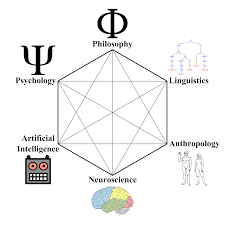Appendix

PSY 416: Cognitive Science catalogue description. Cognitive scientists seek answers to questions about the nature of mind by integrating different methods of inquiry. Doing so helps them arrive at a richer, more inclusive understanding than what can be achieved within a single discipline. Cognitive Scientists have a “home” discipline in fields like Cognitive Psychology, Philosophy, Neuroscience, Linguistics, or Computer Science (to name the dominant perspectives). However, their work is guided by an understanding of the intersections among these areas of inquiry. The point of intersection (and overlap) among disciplines is where the “truth” about big picture-issues like thinking, reasoning, intelligence, and consciousness resides. Cognitive scientists seek to uncover these truths by challenging unitary disciplinary explanations.
Reading & Video Reference List
Note: Readings are presented in the order of course coverage, not the typical alphabetical by first author.
Unit 1 Readings
- MacFarquhar, L. (2018). The Mind Expanding Ideas of Andy Clark. The New Yorker Magazine.
- Mckie, R. (2018). No death and an enhanced life: Is the future transhuman. The Guardian. May, 6.
- Miller, G. (2003). The Cognitive Revolution: A historical perspective. Trends in Cognitive Sciences, 7, 141 – 144.
- Kassan, P. (2005). Al gone awry: the futile quest for artificial intelligence. Skeptic (Altadena, CA), 12(2), 30-40.
- Clark, A. (2014). Introduction: Not like a rock. In Mindware: An Introduction to the Philosophy of Cognitive Science, 2nd edition. Oxford University Press.
- Clark, A. (2014). Some backdrop: Dualism, behaviorism, functionalism, and beyond. In Mindware: An Introduction to the Philosophy of Cognitive Science, 2nd edition. Oxford University Press.
- Clark, A. (2014). Consciousness and the meta-hard problem. In Mindware: An Introduction to the Philosophy of Cognitive Science, 2nd edition. Oxford University Press.
Unit 1 Videos
Blackmore, S. (2008). Memes and “temes”. TED Conferences.
Dennett, D. (2003). The Illusion of consciousness. TED Conferences.
Searle, J. (2013). Our shared condition: Consciousness. TEDxCERN Conferences.
Unit 2 Readings
- Baddely, A. (2012). Working Memory: Theories and controversies. Annual Review of Psychology, 63, 1-29.
- Vygotsky, L. (1986/1934). Thought and Word. In Thought and Language. Translated by Alex Kozulin. MIT Press.
- Boroditsky, L. (2010). How the languages we speak shape the way we think. Cambridge Handbook of Psycholinguistics, 615 – 632.
- Epstein, R. (2016). The empty brain. Aeon, May, 18, 2016.
Unit 2 Videos
Doolittle, P. (2013). How your working memory makes sense of the world. TED conferences.
Burgess, N. (2011). How your brain tells you where you are. TED Conferences.
Chen, K. (2012). Could your language affect your ability to save money? TED Conferences.
Unit 3 Readings
- Marshall, P. (2008). Relating psychology to neuroscience: Taking up the challenges. Perspectives in Psychological Science, 4, 113 – 125.
- Deary, I. J. (2012). Intelligence. Annual Review of Psychology, 63, 453-82. Doi: 10.1146/annurev-psych-120710-100353
- Russell, S. J. & Norvig, P. (2010). Introduction. In Artificial Intelligence: A Modern Approach, 3rd Edition. Prentice Hall.
- Clark, A. (2014). Chapter 1: Meat Machines. In Mindware: An Introduction to the Philosophy of Cognitive Science, 2nd edition. Oxford University Press.
- Clark, A. (2014). Chapter 2: Symbol systems. In Mindware: An Introduction to the Philosophy of Cognitive Science, 2nd edition. Oxford University Press.
Unit 3 Videos
Flynn, J. (2013). Why our IQ levels are higher than our grandparents’. TED Conferences.
Hawkins, J. (2003). How brain science will change computing. TED conferences.
Tegmark, M. (2018). How to empowered, not overpowered, by AI. TED Conferences.
Shane, J. (2019). The danger of AI is weirder than you think. TED Conferences.
Braezeal, C. (2010). The rise of personal robotics. TED Conferences.
Mitchell, M. (2017). How we can build AI to help humans, not hurt us. TED@BCG Milan.
Gruber, T. (2017). How AI can enhance our memory, work, and social lives. TED Conferences.
